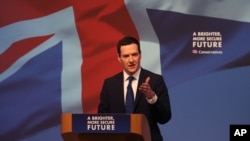Emboldened by his party's election triumph, Britain's finance minister said Tuesday his government has a “very clear mandate” to change the terms of the country's membership in the European Union before it holds a referendum on whether to leave the bloc altogether.
The Conservatives' promise to hold an in/out referendum by 2017 was a key plank of their manifesto in the general election last week. The party's top brass, including Prime Minister David Cameron, have suggested they would only support continued EU membership if the country can change terms related to its membership.
“We go into these negotiations aiming to be constructive and engaged but also resolute and firm, and no one should underestimate our determination to succeed for the working people of Britain and indeed for the working people of the European Union,” finance chief George Osborne said Tuesday ahead of a meeting of his peers from the 28-country EU in Brussels.
Osborne, who is set to be one of the lead negotiators, refused to address speculation that the referendum on so-called “Brexit” may be brought forward to 2016. Many in his party and in the business community think the referendum should take place earlier than planned because it would reduce uncertainty and won't clash with elections in Germany and France.
Migration control as issue
Though details of what the Conservatives want are sketchy, the party noted in its manifesto that it's looking to control migration from the EU by reforming welfare rules.
Many top officials across the EU, including German Chancellor Angela Merkel, have insisted that the principle of the free movement of labor across the bloc is non-negotiable. However, some have been more forthcoming on the idea of changing the way welfare payments are made to migrants.
Though the referendum pledge was not discussed at Tuesday's meeting, early indications are that Osborne isn't going to find it easy to push through reforms, especially if they are so big that they require changes to the EU's treaty.
“I think politicians must decide and act,” said Austrian Finance Minister Hans Joerg Schelling. “And if politicians believe they have to ask the people, that indicates that they are not prepared to take the necessary consequences and decisions.”
French Finance Minister Michel Sapin said there was no discussion with Osborne of “the so-called re-negotiation.”
“This will be for tomorrow. After the ‘Greek weeks’ we will have the ‘British weeks,’ even if they are not of the same nature,” he said, referencing Greece's difficulties in securing much-needed bailout cash.
Eurozone alignment concerns
One of Osborne's concerns is that the 19-country eurozone will vote together to defeat non-euro countries such as Britain and Sweden over wider decisions that affect the EU, most notably with regard to the single market. One of the implications of the eurozone debt crisis of the past few years is that the countries that use the euro are trying to align their economies closer together.
German Finance Minister Wolfgang Schaeuble acknowledged there could be a problem.
“Of course, every step to strengthen the eurogroup must not lead to the differences between eurozone members and non-eurozone members getting bigger.”
Since it joined what was then known as the European Economic Community in 1973, Britain's membership has often been strained. Over the past few years, a groundswell of opinion in the country thinks exiting the EU is the best option, especially at a time when many of its members are getting closer together, notably with the creation of the euro currency. In last week's election, the UK Independence Party, which aims to get Britain out of the EU, won 4 million votes.
The Europe question has troubled the Conservative Party for decades. Splits within the party were notable in the 1990s, when many EU countries were preparing for the euro, and contributed to its spell in opposition between 1997 and 2010. Many think Cameron has opted for a referendum to shore up his party, which is still divided over the merits of Britain's membership.
Britain's Osborne Spells Out Mandate on EU Referendum

BRUSSELS —



